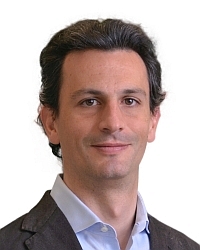TR2018-093
Split-Horizon MPC for Coupled Station Keeping, Attitude Control, and Momentum Management of GEO Satellites using Electric Propulsion
-
- , "Split-Horizon MPC for Coupled Station Keeping, Attitude Control, and Momentum Management of GEO Satellites using Electric Propulsion", American Control Conference (ACC), DOI: 10.23919/ACC.2018.8431329, June 2018, pp. 652-657.BibTeX TR2018-093 PDF
- @inproceedings{Caverly2018jun,
- author = {Caverly, Ryan and {Di Cairano}, Stefano and Weiss, Avishai},
- title = {{Split-Horizon MPC for Coupled Station Keeping, Attitude Control, and Momentum Management of GEO Satellites using Electric Propulsion}},
- booktitle = {American Control Conference (ACC)},
- year = 2018,
- pages = {652--657},
- month = jun,
- doi = {10.23919/ACC.2018.8431329},
- url = {https://www.merl.com/publications/TR2018-093}
- }
- , "Split-Horizon MPC for Coupled Station Keeping, Attitude Control, and Momentum Management of GEO Satellites using Electric Propulsion", American Control Conference (ACC), DOI: 10.23919/ACC.2018.8431329, June 2018, pp. 652-657.
-
MERL Contacts:
-
Research Area:
Abstract:
In this paper, a model predictive control (MPC) policy is developed to simultaneously perform station keeping, attitude control, and momentum management of a nadirpointing geostationary satellite equipped with three reaction wheels and four on-off electric thrusters mounted on two boom assemblies attached to the anti-nadir face of the satellite. The MPC policy includes an inner-loop SO(3)-based attitude control law to maintain a nadir-pointing attitude, and an outer loop for station keeping and momentum management. The MPC formulation makes use of two different prediction horizons; a short horizon is used for the states associated with the orbit's inclination and a longer horizon is used for all other states. This split-prediction horizon MPC policy leads to a significant reduction in delta-v compared to a single horizon. The continuous thrust command generated by the MPC policy is quantized as a single on-off pulse every feedback period in such a way that the predicted error in the states induced by quantization is minimized, which reduces the number of onoff pulses compared to other quantization approaches in the literature, including pulse-width modulation.
Related News & Events
-
NEWS MERL researcher Stefano Di Cairano taught short course for European Embedded Control Institute Date: June 10, 2019 - June 14, 2019
Where: Paris
MERL Contact: Stefano Di Cairano
Research Areas: Control, Dynamical Systems, OptimizationBrief- MERL researcher Stefano Di Cairano and Prof. Ilya Kolmanovsky, Dept. Aerospace Engineering, the University of Michigan, were invited to teach a class on "Predictive and Optimization Based Control for Automotive and Aerospace Application" at the 2019 International Graduate School in Control, of the European Embedded Control Institute (EECI). Every year EECI invites world renown experts to teach 21-hours class modules, mostly for PhD students but also for professionals, on selected control subjects. Stefano and Ilya's class was attended by 30 "students" from both academia and industry, from all around the world, interested in automotive and aerospace control. The module described the fundamentals of modeling and control design in automotive and aerospace through lectures, real world examples and exercises, and placed particular emphasis on techniques such as MPC, reference governors, and optimal control.
-
NEWS IEEE Control Systems Magazine interviews Stefano Di Cairano Date: April 15, 2019
MERL Contact: Stefano Di Cairano
Research Area: ControlBrief- Stefano Di Cairano, senior team leader and distinguished research scientist in the Control and Dynamical Systems group, was interviewed in the April 2019 issue of IEEE Control Systems Magazine. Stefano described himself, promising opportunities in the control field, and how his passion for control research fits well into the industrial research laboratory setting at MERL. It is very good reading for any young researcher considering possible career trajectories.
-
TALK MERL Low-Thrust GEO Satellite Control talk at Stanford University Date & Time: Thursday, February 14, 2019; 1:30 -3:00 PM
Speaker: Avishai Weiss, MERL
MERL Hosts: Stefano Di Cairano; Avishai Weiss
Research Area: ControlAbstract- Avishai Weiss from MERL's Control and Dynamical Systems group will give a talk at Stanford's Aeronautics and Astronautics department titled: "Low-Thrust GEO Satellite Station Keeping, Attitude Control, and Momentum Management via Model Predictive Control". Electric propulsion for satellites is much more fuel efficient than conventional methods. The talk will describe MERL's solution to the satellite control problems deriving from the low thrust provided by electric propulsion.
-
NEWS Control and Dynamical Systems members to deliver 10 papers at American Control Conference Date: June 26, 2018 - June 29, 2018
Where: ACC2018 Milwakee
MERL Contacts: Stefano Di Cairano; Yebin Wang; Avishai Weiss
Research Area: ControlBrief- At the American Control Conference June 26-29, http://acc2018.a2c2.org/, MERL members will give 10 papers on subjects including model predictive control, embedded optimization, urban path planning, motor control, estimation, and calibration.

